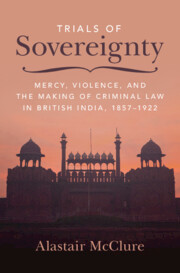Book contents
- Trials of Sovereignty
- Studies in Legal History
- Trials of Sovereignty
- Copyright page
- Dedication
- Contents
- Figures and Table
- Acknowledgments
- Abbreviations
- Introduction
- 1 Forgetting War and Punishing Crime
- 2 The Peace: The Queen’s Proclamation and the Politics of Forgiveness
- 3 The Code: Judges, Juries, and Punishing Difference
- 4 Discretion, the Death Penalty, and the Criminal Trial
- 5 Pardons and Scaffolds
- 6 Tilak’s Radical Innocence: Mercy, Sedition, and the State Trial
- 7 Gandhi’s Guilt and the Return of War
- Conclusion
- Epilogue
- Select Bibliography
- Index
- Studies in Legal History
1 - Forgetting War and Punishing Crime
Published online by Cambridge University Press: 20 November 2024
- Trials of Sovereignty
- Studies in Legal History
- Trials of Sovereignty
- Copyright page
- Dedication
- Contents
- Figures and Table
- Acknowledgments
- Abbreviations
- Introduction
- 1 Forgetting War and Punishing Crime
- 2 The Peace: The Queen’s Proclamation and the Politics of Forgiveness
- 3 The Code: Judges, Juries, and Punishing Difference
- 4 Discretion, the Death Penalty, and the Criminal Trial
- 5 Pardons and Scaffolds
- 6 Tilak’s Radical Innocence: Mercy, Sedition, and the State Trial
- 7 Gandhi’s Guilt and the Return of War
- Conclusion
- Epilogue
- Select Bibliography
- Index
- Studies in Legal History
Summary
Chapter Two explores the declaration of colonial peace through the amnesty offered to rebels in the Queen’s Proclamation of 1858. While this document has already piqued the interest of historians and political theorists of liberalism and “indirect rule,” I turn to this document as an instrument of post-conflict resolution. Comparing and contrasting the variety of strategies used by the state to temper forgiveness, this chapter tracks the creation of an uneven hierarchy of colonial subjecthood organized along lines of relative loyalty and disloyalty. In exploring the wider importance of amnesty at this juncture, this chapter examines this offer as a founding political bargain presented to the defeated. This promise of mercy, in this instance, had been contingent on the full surrender of Indian political agency.
- Type
- Chapter
- Information
- Trials of SovereigntyMercy, Violence, and the Making of Criminal Law in British India, 1857–1922, pp. 32 - 68Publisher: Cambridge University PressPrint publication year: 2024

